how long to become a dentist
If you brush and floss regularly and steer clear of Laffy Taffy, you might think you've got great oral hygiene. Not so fast. Many seemingly innocent everyday habits can damage your teeth—causing decay, eroding enamel, or literally cracking teeth in half. "Tooth enamel is extremely hard, but it's not resistant to everything," says Alex Sharifian, DDS, a Smile Generation–affiliated dentist in Irvine, CA. We talked to dentists about the things they avoid in order to keep their chompers strong and healthy.
Dentists don't…
1. Chew ice
You could easily chip or even break a tooth or dislodge a filling. "It's essentially chewing rocks," says Jonathan Schwartz, DDS, a family and cosmetic dentist at Manhattan Dental Health and an associate professor of clinical dentistry at Columbia College in New York City. "While our teeth are covered by the hardest material in our bodies, they are not designed to hold up to that kind of stress."
(Lose up to 15 pounds WITHOUT dieting with Eat Clean to Get Lean, our 21-day clean-eating meal plan.)
2. Drink bottled water
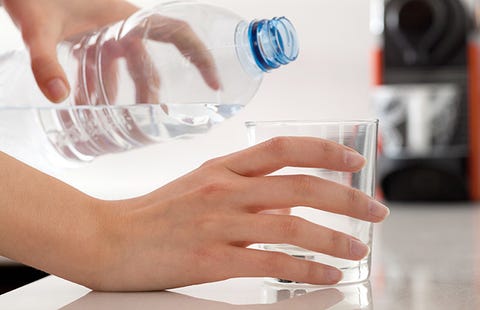
daniel allan/getty images
Some of the best everyday protection for teeth comes from drinking tap water, which is fluoridated. Fluoride fortifies teeth against decay and promotes remineralization, which helps repair minor decay. Most bottled water contains either no fluoride or less than is needed for good oral health, so hit the sink rather than the bottle for your eight glasses a day. If you're a big fan of the bottled stuff, Gregg Lituchy, DDS, a dentist with Lowenberg, Lituchy and Kantor in New York, recommends using an over-the-counter fluoride rinse to up your fluoride quotient, and using tap water to make coffee, tea, and other flavored beverages. (Bored with plain water? Check out these 25 slimming sassy water recipes.)
3. Sip at sports drinks
The trifecta of acidic components, sugars, and chemical additives in sports drinks can weaken enamel, creating openings for bacteria to sneak in. "Consuming excessive amounts of sports drinks may be worse for your dental health than soda," says Sharifian. If you must have Gatorade or the equivalent, knock it back all in one sitting—instead of sipping it throughout the day, which just puts the exposure on repeat—and consider sipping it through a straw. Swish with water afterward or chew sugar-free gum to neutralize the acids. Same goes for soda.
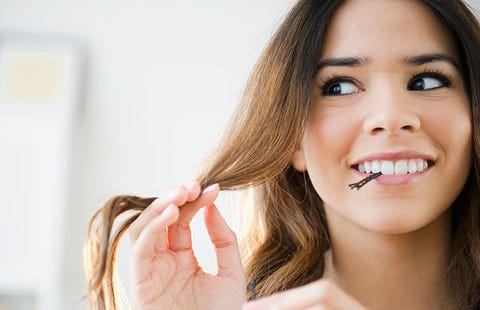
jgi Jamie Grill/Getty Images
Using your teeth to open bottles, tear off sales tags, or rip open plastic bags is a recipe not just for chipping, cracking, or fracturing your teeth, but also for seriously cutting the inside of your mouth or even throwing your jaw out of balance, which can lead to chronic jaw pain. "I promise you, a scissor or knife is 100% more effective than your teeth to get that package of chips open," Schwartz says. "Teeth are also not meant to chew on pens, the ends of eyeglasses, or straws, or to act as a third hand while carrying things," he adds. You may not realize how much pressure you're exerting, and it can cause teeth to shift out of place or the enamel to splinter.
5. Carbo-load
Breads, pasta, and crackers don't start out as sticky, sugary junk food, but they quickly turn into sugars in your mouth. "Bacteria in the mouth feed on that sugar, causing tooth decay," says Lituchy. "I try not to eat too much highly processed starch, but if I'm going to go out and have a big bowl of pasta, I'm going to brush right after, before the bacteria can convert those sugars into acid that corrodes my teeth."
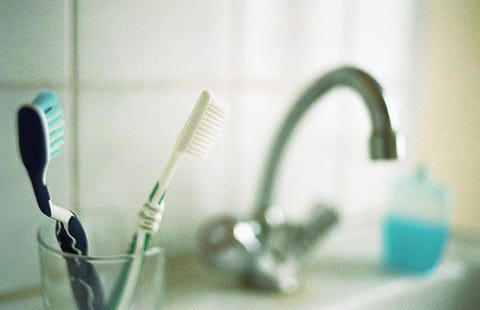
photoalto/katarina sundelin/getty images
Storing your toothbrush on the counter—especially clustered in a holder with other people's toothbrushes—invites the mingling of bacteria, and you could easily catch something from a family member. Then there's the gross finding that tiny particles of fecal matter can aerosolize (and land on your toothbrush) when you flush the toilet. "Not that our mouths aren't already full of bacteria," Schwartz says, "but you don't want to add to the mix from other things floating in the air in bathrooms." Try keeping your toothbrush in the medicine cabinet or using a disposable toothbrush shield that tamps down bacterial growth, such as those by IntelliDent (10 for $4.49 at amazon.com).
MORE: The 10 Worst Things That Can Happen When You Don't Get Enough Vitamin D
7. Use mouthwash without rinsing afterward
Mouthwash is great for killing bacteria you may have missed after brushing and flossing, but the alcohol it leaves behind can dry out your mouth, setting it up for decay. "Harmful bacteria thrive in a dry environment," explains Carolyn Ghazal, DDS, a Smile Generation–affiliated dentist in Irvine, CA. Little fissures in the tongue and throughout the mouth are more exposed when the mouth is dry, so bacteria can easily settle in. Choose an alcohol-free mouthwash such as Listerine Zero or swish with water afterward to rinse out the alcohol.
8. Chomp on popcorn
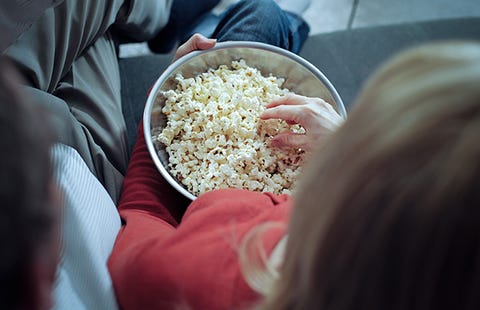
jonathan bielaski/light imaging/getty images
Hard popcorn kernels, if they're not fully popped, are trouble for fillings. "If you have a filling in your tooth and a kernel gets between the filling and the tooth and you bite down, you could crack your tooth in half," says Lituchy. "I have patients come in with cracked teeth and I ask, 'Popcorn?' and they're like, 'How did you know?' It's the No. 1 cause of cracked teeth in my practice."
9. Brushing at the wrong time
Brushing immediately after meals is usually wise, but not after a high-acid food or drink, including wine, coffee, soda, citrus fruits, or fruit juices. "After having something like a fruit smoothie, which is highly acidic, the enamel on your teeth will be temporarily weakened," Lituchy explains. "Wait about 45 minutes before brushing to give your saliva a chance to dilute the acidity." Otherwise, he says, the abrasion of the toothbrush on the softened enamel could cause damage. You can also rinse with water to help neutralize the acid.
10. Skip brushing…ever
We've all had long, grueling days where just crawling into bed takes all the energy we have left. "In that moment of self-evaluation—about the real risks of not brushing—I will always get up and go brush," Schwartz says. "We find time to brush in the morning, but nighttime, before bed, is really the most critical." That's because plaque, which builds on teeth throughout the day, can calcify and become tartar within 24 hours. And at that point, you can't just brush it off or floss it away—it must be scraped off by a dental hygienist.
MORE: Drink This, Sleep 90 Minutes More A Night
11. Give up gum
Sugary bubble gum is clearly a dental don't, but chewing the sugarless stuff may improve oral health. "Saliva is our body's own best defense against cavities, so anything you can do to increase saliva production, especially after a meal, can help protect teeth," says Schwartz. Saliva contains many key components that naturally help remineralize teeth and keep the mouth from drying out, which leads to decay. "I tell my patients that chewing sugar-free gum with xylitol after a meal is a great way to help not just beat bad breath, but also prevent cavities," Schwartz says. Xylitol is a natural plant-based sweetener that prevents bacteria from sticking to teeth and has been shown to reduce cavity-causing bacteria in your mouth. (Consider these 8 kinds of gum that aren't packed with sugar and sketchy chemicals.)
12. Drink wine without Vaseline
The acidity in red wine (and tea and coffee) can soften enamel, especially if you swish it around in your mouth, giving the dark liquid an opportunity to stain or darken teeth. The tannins can even lodge in tiny grooves of your tooth enamel, creating a sticky surface that holds on to cavity-causing bacteria. You could swear off the swish and also rinse with water when your wine glass is empty, but some dentists go a step further, protecting their pearly whites with a coating of Vaseline. "The Vaseline acts as a barrier between your teeth and the liquid," says Lituchy, who actually does this. "It also gives your teeth a little luster."
13. Brush too hard
Thorough is good; aggressive is bad. Brushing too vigorously can not only irritate your gums and make teeth more sensitive to cold temperatures, but it can actually wear down your enamel and open the door to cavities. One way to ensure a gentler touch is to use a soft-bristled toothbrush, which is firm enough to remove plaque, but soft enough to prevent damage by even the most enthusiastic brushers.
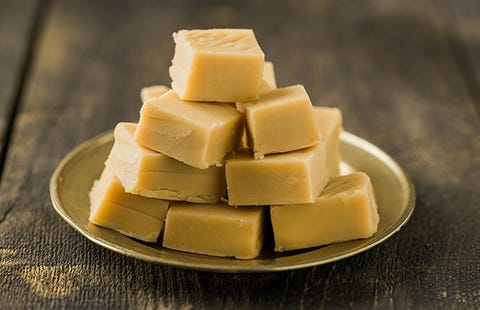
westend61/Getty Images
You probably know that sticky candies and sweets that linger in your mouth—lollipops, caramels, hard candy, and toffee—get a thumbs down from dentists, Sharifian says. But many of us suck on other things, including cough drops and lemon wedges, which can set us up for tooth decay. Many lozenges contain refined sugars, so they're no better than candy—unless you read the ingredient labels to find brands that have low or no sugar. Lemons are very acidic and can corrode tooth enamel with repeated exposure. It's fine to squeeze them into drinks, but don't brush right afterward (see number 9).
MORE: The Best Vitamins To Fix Your 14 Worst Vices
15. Blow off their dental checkup
Dentists recommend that we get our teeth cleaned every 6 months—but many people skip it, which can lead to big problems down the line, says Schwartz. "Typically in the mouth, small problems grow slowly," he says. "But as 6 months becomes a year, then becomes 2 or 3, that tiny little cavity that wasn't causing any problems suddenly becomes a much bigger issue, usually requiring a lot more expense to take care of." Set up your next appointment before you leave the dentist's office—don't expect to remember to do it later at home.
This content is created and maintained by a third party, and imported onto this page to help users provide their email addresses. You may be able to find more information about this and similar content at piano.io
how long to become a dentist
Source: https://www.prevention.com/health/a20482461/things-dentists-never-do/
Posted by: hixthavite.blogspot.com

0 Response to "how long to become a dentist"
Post a Comment